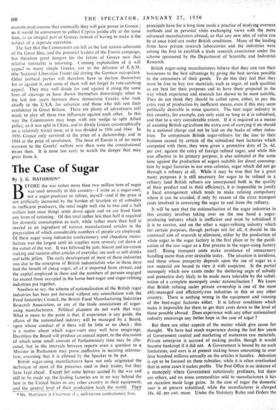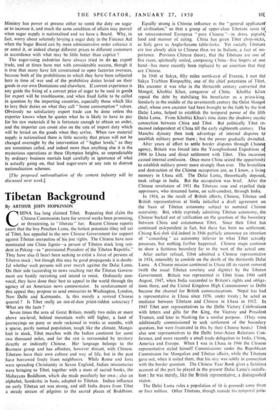The Case of Sugar
By J.G. MATHIESON*
BEFORE the war rather more than two million tons of sugar was used annually in this country—I write as a sugar-user, not a sugar-producer or refiner, myself—and if the price is mot artificially increased by the burden of taxation or of subsidies to inefficient producers, the total might well rise to two and a half million tons once things settle down again and we are freed from any form of rationing. Of this total rather less than half is required for domestic consumption as such, while rather more than half is needed as an ingredient of various manufactured articles in the preparation of which considerable numbers of people are employed. Of these sugar using industries confectionery and chocolate manu- facture was the largest until its supplies were severely cut down at the outset of the war. It was followed by jam, biscuit and ice-cream making and various other articles of everyday use such as soft drinks and table jellies. The early development of most of these industries was due to the enterprise of British industrialists who in those days had the benefit of cheap sugar, all of it imported from abroad, and the capital employed in them and the numbers of persons engaged far exceed those occupied in the home beet-sugar and sugar-refining industries put together.
Needless to say, the scheme of nationalisation of the British sugar industries has been put forward without any consultation with the Food Industries Council, the British Food Manufacturing Industries Research Association, or any of the trade associations of sugar- using manufacturers. Political planners do not work that way. What is more to the point is that, if experience is any guide, the affairs of the nationalised industry will be managed by a Board, upon whose conduct of it there will be little or no check ; this is a matter about which sugar-users may well have misgivings. Doubtless the Board will produce an annual report, to the discussion of which some small amount of Parliamentary time may be allo- cated, but in the intervals between reports even a question to a Minister in Parliament may prove ineffective in securing informa- tion, assuming that it is allowed by the Speaker to be put.
British sugar-using manufacturers have not only originated the technique of most of the processes used in their trades, but they have kept ahead. Except for some leeway caused by the war and still to be made up, the leading factories are in no way behind the best in the United States or any other country in their equipment, and the general level of their production leads the world. Their • Mr. Mathieson is Chairman of a well-known confectionery firm.
principals have for 'a long time made a practice of studying overseas methods and in personal visits exchanging views with the more advanced manufacturers abroad, so that any new idea of value can be at once tried out under British conditions. Many of the leading firms have private research laboratories and the industries were among the first to establish a trade research association under the scheme sponsored by the Department of Scientific and Industrial Research.
British sugar-using manufacturers believe that they can run their businesses to the best advantage by giving the best service possible to the consumers of their goods. To do this they feet that they must be free to buy raw materials, such as sugar, of such qualities as are best for their purposes and to have them prepared in the way which experience and research has shown to be most suitable. They do not think they should be called upon, either, to pay the extra cost of production by inefficient means, even if this may seem politically desirable in some quarters. The beet sugar industry in this country, for example, can only exist so long as it is subsidised, and that to a very considerable extent. If it is required as a means of assisting British agriculture the extra cost of carrying it on should be a national charge and not be laid on the backs of other indus- tries. To compensate 'British sugar-refiners for the loss to their business caused by certain of the subsidised beet factories which competed with them, they were given a protective duty of 2s. 4d. per cwt. against the entry of foreign refined sugar, and while this was effective in its primary purpose, it also militated at the same time against the production of sugars suitable for direct consump- tion by sugar factories in our own colonies, sugar which did not go through a refinery at all. While it may be true that for a great many purposes it is still necessary for sugar to be refined in a refinery (and British refiners are unsurpassed both in the quality of their product and in their efficiency), it is impossible to justify a fiscal arrangement which tends to make refining compulsory where it can be avoided, if only by reason of the extra transport costs involved in conveying the sugar to and from the refinery.
It will be seen that the nationalisation of the sugar industries in this country involves taking over on the one hand a sugar- producing industry which is inefficient and must be subsidised if it, is to survive, and on the other a sugar-refining industry which for certain purposes, though perhaps not for all, it should be the continual aim of research to eliminate, either by the production of white sugar in the sugar factory in the first place or by the purifi- cation of the raw sugar as a first process in the sugar-using factory itself. Rising transport costs make avoidance of unnecessary handling more than vier desirable today. The situation is invidious, and those whose prosperity depends upon the use of sugar as a raw material are bound to view it with suspicion. Is the partial monopoly which now exists under the sheltering aegis of subsidy and protective duty likely to be made more tolerable by the substi- tution of a complete monopoly under nationalisation ? We know that British refining under private ownership is one of the most ably-managed and efficiently-run industries in this or any other country. There is nothing wrong in the equipment and running of the beet-sugar factories either. It is labour conditions which make it impossible for them to get their costs down to the level of those possible abroad: Does experience with any other nationalised industry encourage any better hope in the case of sugar ?
But there are other aspects of the matter which give cause for thought. We have had much experience during the last few years of Government control and marketing of numerous raw materials. Private enterprise is accused of making profits, though it would become bankrupt if it did not. A Government is bound by no such limitations, and ours is at present making losses amounting to over four hundred millions annually on the articles it handles. Attention is apt to be focused on these subsidies, while it is often overlooked that in some cases it makes profits. The Post Office is an instance of a monopoly where Government notoriously profiteers, but there are others, and on some commodities sold to manufacturers it his on occasion made large gains. In the case of sugar the domestic user is at present subsidised, while the manufacturer is charged 18s. 4d. per cwt. more. Under the Statutnry Rules and Orders the
Ministry has power at present either to remit the duty on sugar or to increase it, and much the same condition of affairs may prevail when sugar supply is nationalised and we have a Board. Why, in fact, worry about solemnly levying a sugar duty in the Finance Act when the Sugar Board can by mere administrative order enhance it or annul it, or indeed charge different prices to different customers in accordance with what may be little better than caprice ?
The sugar-using industries have always tried to do an export trade, and at times have met with considerable success, though it is true that many have felt constrained to open factories overseas, because both of the prohibitions to which they have been subjected here in time of war and of the prohibitive duties levied on their goods in our own Dominions and elsewhere. If current experience is any guide the fixing of a correct price of sugar to be used in goods for export will be troublesome, and when fixed liable to be called in question by the importing countries, especially those which like to levy their duties on what they call "home consumption' values. Obviously no satisfactory export trade can be done unless the exporter knows when he quotes what he is likely to have to pay for his raw materials if he is fortunate enough to obtain an order, and the importer can count also on the rate of import duty which will be levied on the goods when they arrive. When raw material supply is nationalised there is little security that prices will not be changed overnight by the intervention of "higher levels," as they are sometimes called, and indeed more than anything else it is the mysterious operations at these Olympian heights, so unpredictable by ordinary business mortals kept carefully in ignorance of what is actually going on, that lead sugar-users at any rate to distrust nationalisation schemes.
[The proposed nationalisation of the cement industry will be discussed next week.]











































 Previous page
Previous page